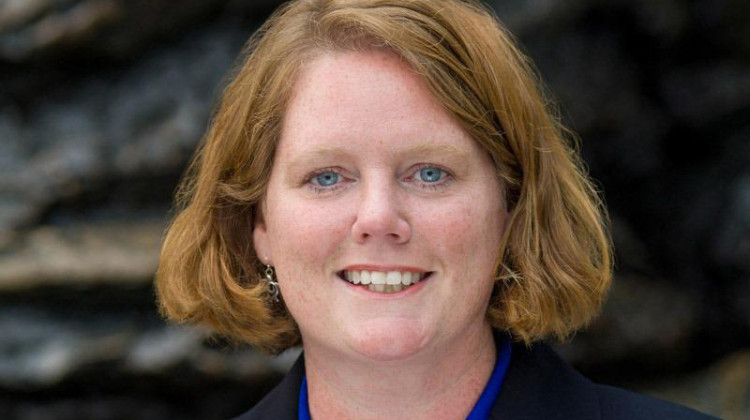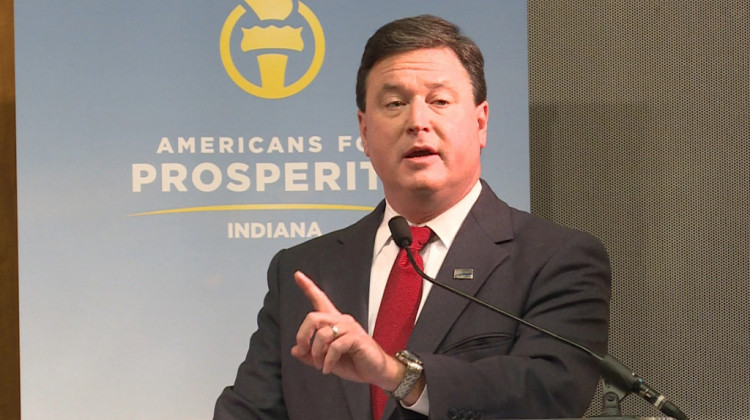
Cynthia Wirth is a scientist and teacher who spent time as a congressional legislative fellow.
Courtesy of Cynthia Wirth's campaign websiteWFYI is speaking with U.S. House of Representatives candidates running for election in Central Indiana.
Democrat Cynthia “Cinde” Wirth is running for office in the 6th Congressional District, which includes southern parts of Marion County and covers a portion of central and eastern Indiana. She faces Republican Jefferson Shreve and Libertarian James Sceniak.
Wirth is a scientist and teacher who spent time as a congressional legislative fellow. The vacated seat was freed up after Republican Rep. Greg Pence said in January that he would not run for reelection.
WFYI’s Rachel Fradette met with Wirth to discuss why she’s running for the seat.
Note: James Sceniak did not respond to our request for an interview. Jefferson Shreve's campaign agreed to an interview but later canceled it.
This transcript has been lightly edited for clarity and style. WFYI fact checks all candidate interviews and provides editor’s notes in the audio and digital publications.
Rachel Fradette: Why are you running for office again? What have you learned in your previous campaigns?
Cynthia Wirth: In 2020, I ran for state senate in the southern part of Indiana, and that was kind of during COVID. We had an empty ballot slot. So that was kind of a warm up act, just to kind of get a feel for it. Again, it was during COVID, so it wasn't anything that we could really do a lot of normal campaign work. But my decision to run actually came before that, in 2018-2019 when I was a fellow at the U.S. House of Representatives in Washington D.C. and when I saw what was happening in Indiana in my classroom.
Because I was a teacher and my fellowship was for teachers to learn policy at the federal level, and I saw that federal policy could change the lives of the students I had been working with. That's when my decision to run for office came about. We had someone already running for this seat in 2020 so with an empty ballot slot, I decided to go ahead and test the waters there. And it was, it came very natural to me. I think, having been a teacher and being a scientist as well as a small business owner, because it's all of those things together that really is what campaigning is. It's working with people directly, one on one. It's taking into account business, it's taking into account education, and it's taking into account all the things that affect us that have a science background.
So in 2022, the seat was open for a challenger to Greg Pence, and that was originally my intention, coming back from Washington, D.C., so I wasn't really planning on running in 2022. I was in the middle of finishing my doctorate in educational policy, so I went ahead and did it, and It turned out really well. So losses are measured in ranges, and we made significant gains in a couple of counties with a new candidate on the ballot. People really not that familiar with me, so that was a real win for us that way, and now it's an open seat. So I decided to go ahead and come back, because this was the year I had planned to run.
Fradette: What are the issues that you foresee affecting the sixth district, and you know that over the next two to three years, and why do you feel that those are some of the ones that you need to be paying attention to?
Wirth: So our quality of life in Indiana is ranked one of the lowest in the nation, and I think that speaks to the fact that what I saw in my classroom reflected that. And that's that parents often have to work more than one job to make ends meet, to pay the rent and put food on the table. And that affects our students in classrooms, and it affects their ability to learn. It affects their test scores. It affects a lot of things.
So that's a really important part of what I'm looking to help solve is this wage equality, so that we put back our middle class, making sure that we have a free and public education and that's supported financially by, you know, by our communities. And again, back to my science background, looking at our overall environment, because we have one of the worst air and water qualities in the nation as well, and that comes directly from what we're putting into our air and into our water.
And those come from those that can be solved at the federal level, and looking at those policies that don't have to be a win-lose situation, they can be a win-win. And I think my background as a small business person, I understand how to make those win-win situations happen.
Fradette: How would you support policies to combat inflation and breed more opportunity and jobs in this district?
Wirth: It's a great question. The economy is always at the top of the list, because none of us will survive without, you know, a thriving economy. And I think we can put forth policies that not only protect businesses, but also protect people. And we don't have to have that narrative that employment and a strong economy comes at the expense of everyday people, and we can retain businesses in Indiana with different policies that are also beneficial to our workers.
And I think those are the kind of things that I taught in my classroom. I taught all of those laws that protected not only workers and the workplace, but the environment along with that, and it's all related. So as a biologist, I like to talk about all of our economy and our healthcare and our jobs and everything as an entire system — and it's all interrelated.
And when we look at it from that system point of view, that's where we can find those solutions that are win-win. Jobs in the economy, you know, when we look at energy and energy usage, alternative energy has gotten a bad rap from people because they say, well, it's at the expense of jobs, but it doesn't have to be, and we've seen that be very successful in a lot of other communities. And I'm part of a group that's working on some hydrogen solutions, and that's another one that can be a win-win for even our farmers in our rural areas.
And you know, it doesn't, it doesn't have to be those things that the narrative is really easy to spin, that once you make a change, it's always negative. There's a lot of really positive things that can come out of looking forward.
Fradette: Having been a teacher, Indiana schools are facing numerous challenges, including literacy and declining college going rates. How would you advocate for the state's children in Washington, and is that a crucial part of your plan?
Wirth: It is, in fact, that's really the reason why I ended up in a fellowship in Washington to begin with, was my students were asking me how we can make all of this better. And they saw that they were on the losing end of a lot of things happening in Indiana and education. So when we look at education in the United States, we have a free and non-sectarian that means non religion based public education.
And that's one of the strengths of our communities across the United States. And I think that is important to protect and to provide, make sure that there is adequate funding for, so that our students don't lose. And different schemes that come up that can take that money away from our public schools, I think, need to be really rethought and looked at what the actual impact is on students and where those dollars are going and how they're being accounted for. Because we have strict accounting in public school systems on dollars and what students get for those dollars.
Some of those are federal protections for a lot of students, and when those dollars are going to other schools outside of the public education system, there's no accounting that those federal protections are being upheld. So those are some areas that I'm really, really interested in helping make sure that our students in Indiana have access to everything that they need.
Fradette: What is your top concern regarding public safety in the 6th District?
Wirth: So I think when we have gun laws that are focused on safety, and that doesn't mean restricting guns, it doesn't mean taking guns away. It means approaching weapons and weapons of war with a degree of respect that is afforded that those weapons receive in military and other places where they are designed to be used, that does not transfer to our streets and our schools.
And I think safety begins where we can assess what's right and what's appropriate in what location. And so when I look at public safety, as far as guns are concerned, that means that we need stronger background checks. We need comprehensive systems across the nation where communities all are a part of the same system. So there's no gap, and everything overlaps. And I think that's what best protects our public and then when you transfer that to schools, and again, I've been that teacher in that classroom when we've had a lockdown.
And I've had to, you know, hide students, and our students shouldn't have to be growing up this way. And when we look at when these problems started to become problems is when we relaxed those laws, those gun safety laws. And I grew up in the 1970s. My family were hunters. I learned how to shoot a gun early, but I also learned how to responsibly take care of a gun, store a gun, and when guns should be used and when they shouldn't be used.
Fradette: So just over two years ago, Indiana lawmakers voted to ban most abortions with exceptions for rape, incest and certain serious medical complications and emergencies for the person having the pregnancy. Would you support Congress enshrining abortion protections? What would you like to see change in the state for reproductive care?
Wirth: I absolutely would, because abortion is a health care procedure, and it is something that saves numerous lives and has for decades. It's a safe medical procedure. If there's a miscarriage that is having complications, or pregnancy that's having complications putting a mother's life at risk.
Or, you know, even in the case of ectopic pregnancies, which most people don't realize what those are and how severe those are. Those are instances where doctors and the patients should be making those decisions, and not legislators. As a person who had a miscarriage that didn't end real well, I was fortunate enough to be able to access care when I needed it.
If I had had that same experience today, that wouldn't be possible. And so that just sort of rips right at the very fabric of protecting families and protecting women's health care. So I absolutely think that is something that belongs between a doctor and a patient and not in the legislative arena.
Fradette: What specific steps will you take to address environmental concerns in your congressional district, from water to climate change? What type of protections are you weighing that you would bring out of your seat in Washington?
Wirth: So one of the things I taught my environmental science students was the complete history of the EPA and the environmental movement, and why those happened, and what was happening in our country to drive those movements. And when we look back and it's not that far back to a 20 year old, it seems like it's ages ago, but to somebody like me who's in their 50s, it was right around the time I was born and growing up, we had rivers on fire from pollution.
You know, today's world, we're seeing wildfires and we're seeing floods and we're seeing, you know, hurricanes and bad storms. We've always had those. They're intensifying. So when we look at those, those controls that that we set the Environmental Protection Agency up with, the EPA, that is an agency to protect our environment and protect workers and families and people who are upwind downwind, you know, that are affected by by things in that may be happening in our environments or being put into our environments.
And as I was saying earlier, when we have these protections, it doesn't always mean that businesses lose. We have a lot of technology and we have brilliant people working on solutions that we can — everybody can – win for businesses as well as people. So those are some things that I would be looking to do at the federal level. And I have a deep understanding of that, because I taught it for so long.
Fradette: The 2024 presidential election is heating up right now with discussions about the vice presidential selections. Can you tell us who you're backing in our state for Indiana's governor and the U.S. president that you're hoping will take office in November?
Wirth: So Jennifer McCormick and Terry Goodin are both educational professionals. And I think in Indiana, what we need right now are people who understand education inside and out. It's the largest item in our state budget. And I think Dr. Jennifer McCormick and Dr. Terry Goodin are the two people that are best poised to lead our state in that arena, and then at the national level, I think Vice President Harris and Tim Walz, again, another teacher.
And I think when you look at their backgrounds, the things that they have accomplished in their time, leading their communities and leading our nation, those are the things that we want. Those are the values that I think all Americans value. And it's refreshing. It's very positively focused, and that's what draws me to, actually, all four of those candidates. It's doing something for people. And that's exactly why I'm running, is to do something for people.
 DONATE
DONATE







 Support WFYI. We can't do it without you.
Support WFYI. We can't do it without you.